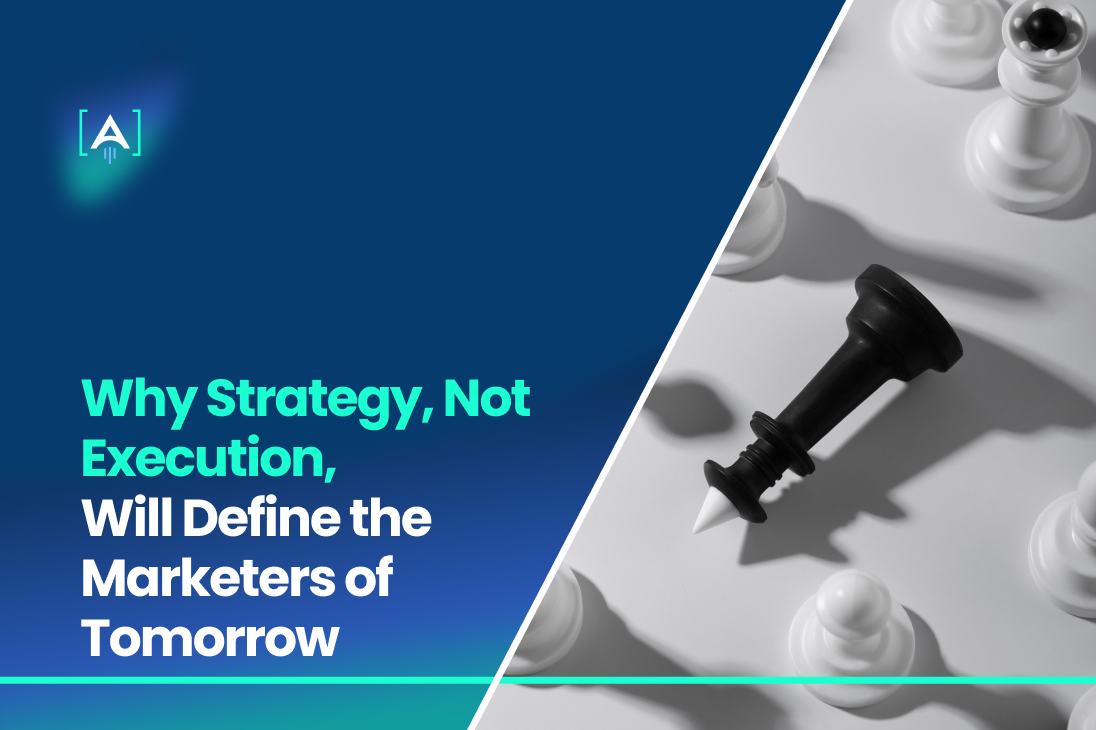They say speed kills. In marketing, it’s a killing strategy.
AI can now spin up ads, emails, and landing pages in minutes, yet 93% of campaigns still fail to generate a positive ROI.
The problem? Execution without vision.
Partnering with a Vibe Marketing Agency flips that equation, turning AI from a mindless executor into a brand amplifier that radiates your unique vibe across every touchpoint.
In this article, and even more so in our upcoming Vibe Marketing Webinar, you’ll see why tomorrow’s marketing leaders will win with strategy, not speed, and how the Vibe approach is rewriting the rules.
The Shift: From Execution-Centric to Strategy-First Marketing
Not long ago, marketing teams were celebrated for how quickly they could execute: launching ads, posting on social media, and tweaking campaigns on the fly.
But with AI execution automation now handling those tasks in seconds, the real competitive edge is what direction you’re moving in.
In this strategic marketing in the AI era, the winners aren’t the brands that flood the market with content; they’re the ones that know exactly which messages matter, which audiences to target, and how to orchestrate the perfect emotional connection.
The speed race is over. Now it’s about precision, resonance, and intentionality.
We’re already seeing this in the vibe marketing trend 2025: brands are leaning into identity, culture, and “vibe” to differentiate themselves in an AI-saturated landscape.
The ones with a clear strategy turn automation into a growth engine. The ones without? Just faster at failing.
Why Vibe Marketing Is the Strategic Advantage
The difference between vibe marketing vs. traditional marketing comes down to how work gets done.
Traditional marketing focuses on human execution – product campaigns, creative approvals, and linear workflows.
Vibe Marketing, on the other hand, focuses on AI-powered systems that automate execution, optimize in real time, and scale performance exponentially.
At the core of this approach is your Vibe Stack – a connected ecosystem of AI agents, automation workflows, and data feedback loops that run your marketing with minimal human input.
This stack defines how your brand operates:
how it produces content, tests offers, deploys creatives, and adapts based on live performance data continuously, and autonomously.
With the right Vibe Marketing tools, you can replicate your strategy across channels, campaigns, and audiences instantly.
AI handles the execution; humans handle the direction.
The result is marketing that improves itself.
Execution without this AI backbone?
Just more noise in a crowded, over-automated marketplace.
The Rise of AI Agents in Marketing Execution
Over the past two years, AI agents in marketing have moved from experimental tools to core operational assets.
They can build landing pages, schedule posts, adjust ad bids, generate content variations, and personalize customer outreach, all without human intervention.
This level of AI execution automation means tasks that once took entire teams can now be completed in minutes.
These systems can also automate touchpoints AI across the customer journey, from first click to post-purchase follow-up.
Paired with AI marketing optimization, they continually test and refine campaigns for better performance.
But while AI agents are powerful executors, they can’t determine what to execute or why.
Without a clearly defined strategy, they’ll optimize the wrong messages for the wrong audience, just faster.
That’s why human marketers still own the role of directing AI toward strategic goals that support long-term brand growth.
Strategic Skills Marketers Must Master in the AI Era
As execution becomes increasingly automated, marketers need to focus on the skills that shape AI-driven campaigns and keep them aligned with brand objectives.
The most in-demand capabilities include:
- Vibe coding – Translating brand values, tone, and emotional cues into structured guidelines that AI can understand and replicate.
- Designing AI-driven brand campaigns – Creating campaign frameworks that maintain brand consistency while allowing AI to personalize at scale.
- Mapping and managing the GTM stack – Knowing how different go-to-market tools integrate and ensuring they work toward strategic goals.
- Customer journey architecture – Defining each step from awareness to conversion so AI agents know how to engage and when.
- Creative oversight – Reviewing and refining AI-generated assets to ensure they meet brand standards and resonate with target audiences.
In short, tomorrow’s best marketers will be the clearest thinkers, capable of directing powerful AI systems toward results that matter.
Preparing for the Next Decade of Marketing
The pace of change in marketing technology means skill sets will shift dramatically over the next 5–10 years.
As automation advances, many routine tasks will no longer require human involvement, leading to discussions about AI replacing marketing teams for execution-heavy roles.
In this environment, the marketer’s primary value will come from strategic leadership, brand stewardship, and the ability to adapt campaigns to evolving cultural and market conditions.
Technology will do the heavy lifting, but humans will set the direction, define the brand’s positioning, and ensure authenticity.
Building a vibe marketing tech stack now is one of the best ways to future-proof a brand.
By integrating AI execution tools with strategic oversight processes, businesses can scale without losing control of their brand voice and customer relationships.
The brands that prepare today will be the ones thriving in a landscape where speed is universal, but strategy is rare.
Conclusion: The Vibe-Driven Marketer of Tomorrow
Execution is no longer the differentiator: AI has leveled that playing field.
What separates tomorrow’s winning brands is their ability to define, protect, and amplify their strategic vision.
At [A] Growth Agency, we help businesses build that edge through Vibe marketing, crafting strategies that AI can execute flawlessly while keeping the brand’s emotional and cultural essence intact.
If you’ve found this article valuable, you’ll get even more from our upcoming Vibe Marketing Webinar, where we’ll break down real-world case studies, emerging AI trends, and the exact frameworks we use to help brands scale without losing their soul.
The future belongs to marketers who lead with strategy and let AI handle the rest. Let’s make sure you’re one of them.

